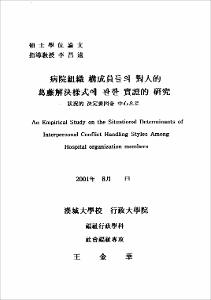病院組織 構成員들의 對人的 葛藤解決樣式에 관한 實證的 硏究
- Files in This Item:
-
-
Download
 000000065988.pdf
기타 데이터 / 3.47 MB / Adobe PDF
000000065988.pdf
기타 데이터 / 3.47 MB / Adobe PDF
-
Items in Repository are protected by copyright, with all rights reserved, unless otherwise indicated.
 000000065988.pdf
기타 데이터 / 3.47 MB / Adobe PDF
000000065988.pdf
기타 데이터 / 3.47 MB / Adobe PDFItems in Repository are protected by copyright, with all rights reserved, unless otherwise indicated.